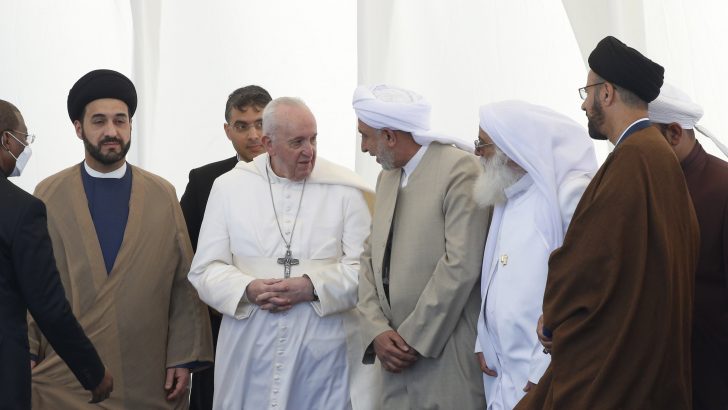by Cindy Wooden
Travelling to the birthplace of Abraham, Pope Francis urged believers to prove their faith in the one God and father of all by accepting one another as brothers and sisters.
From a stage set on a dusty hill overlooking the archaeological dig at Ur, Abraham’s birthplace about ten miles from modern-day Nasiriyah, the Pope called on representatives of the country’s religious communities to denounce all violence committed in God’s name and to work together to rebuild their country.
“From this place, where faith was born, from the land of our father Abraham, let us affirm that God is merciful and that the greatest blasphemy is to profane his name by hating our brothers and sisters,” the Pope told the representatives.
“Hostility, extremism and violence are not born of a religious heart: they are betrayals of religion,” he insisted.
Pope Francis arrived in Ur after a 45-minute early morning meeting in Najaf with 90-year-old Ayatollah Ali al-Sistani, one of Shiite Islam’s most authoritative figures.
At the large interreligious meeting later, with the Ziggurat of Ur, a partially reconstructed Bronze-Age pagan temple, visible in the haze, Pope Francis insisted that when Jews, Christians and Muslims make a pilgrimage to Abraham’s birthplace, they are going home, back to the place that reminds them they are brothers and sisters.
Representatives of Iraqi’s Shiite Muslim majority, its Sunni Muslim community, Christians, Yazidis and Mandaeans, a group that claims to be older than Christianity and reveres St John the Baptist, joined Pope Francis at Ur.
Farmon Kakay, a member of a delegation from Iraq’s small Kaka’i community, a pre-Islamic religion and ethnic group related to the Yazidis, told Catholic News Service, “To see His Holiness is big news for me. We want the Pope to take a message to the government to respect us.”
Faiza Foad, a Zoroastrian from Kirkuk, had a similar hope that Pope Francis’ visit would move the government and Iraqi society as a whole to a greater recognition of religious freedom for all.
Wearing a white dress trimmed in gold and decorated with sequins, Ms Foad told CNS that even though her religion is not an Abrahamic faith, participating in the meeting was a sign that all people are members of the one human family.
In fact, Rafah Husein Baher, a Mandaean, told Pope Francis that “together we subsist through the war’s ruins on the same soil. Our blood was mixed; together we tasted the bitterness of the embargo; we have the same identity.”
From the US-led invasion of Iraq in 2003 and through the reign of terror of the Islamic State group, “injustice afflicted all Iraqis,” she told the Pope. “Terrorism violated our dignity with impudence. Many countries, without conscience, classified our passports as valueless, watching our wounds with indifference.”
Just as Abraham set out from Ur and became patriarch of a multitude of believers in the one God, Pope Francis said, those believers must return to Abraham, recognise themselves as brothers and sisters and set out to share the news that God loves every person he created.
“We believers cannot be silent when terrorism abuses religion,” the Pope said. “Indeed, we are called unambiguously to dispel all misunderstandings. Let us not allow the light of heaven to be overshadowed by the clouds of hatred!”
Called like Abraham to trust in God and to set out on the paths he indicates, believers must “leave behind those ties and attachments that, by keeping us enclosed in our own groups, prevent us from welcoming God’s boundless love and from seeing others as our brothers and sisters.”
No individual or group can live in peace or achieve progress alone, he said. “Isolation will not save us.”
The answer is not “an arms race or the erection of walls” either, the Pope said. “Nor the idolatry of money, for it closes us in on ourselves and creates chasms of inequality.”
The journey of peace, he said, begins with “the decision not to have enemies.”
It means spending less money on weapons and more on food, education and healthcare, he said. It means affirming the value of every human life, including “the lives of the unborn, the elderly, migrants” and everyone else.
Meanwhile, in a low-key meeting followed closely in Iraq and beyond, Pope Francis and Ayatollah Ali al-Sistani, the influential leader of Shiite Muslims in Iraq, spent 45 minutes speaking privately. The 90-year-old ayatollah, who turns down most meeting requests, issued a statement after his encounter in Najaf with the Pope on Saturday morning, saying that world religious leaders should work to hold “great powers” to account, calling upon them “to give priority to reason and wisdom, to reject the language of war, and not to expand concern for their self-interests over the rights of people to live in freedom and dignity.” Pope Francis “underlined the importance of collaboration and friendship among religious communities so that, cultivating mutual respect and dialogue, they can contribute to the good of Iraq, the region and all humanity,” the Vatican said in a communique. The meeting, the Vatican said, also gave the Pope a chance to thank the ayatollah and the Iraqi Shiite community, which “raised their voices in defence of the weakest and the persecuted, affirming the sacredness of human life and the importance of the unity of the Iraqi people” when Islamic State militants were on a rampage from 2014 to 2017.


 Michael Kelly
Michael Kelly Pope Francis talks with a religious leader during an inter-religious meeting on the plain of Ur near Nasiriyah, Iraq on Saturday. Photo: CNS
Pope Francis talks with a religious leader during an inter-religious meeting on the plain of Ur near Nasiriyah, Iraq on Saturday. Photo: CNS 